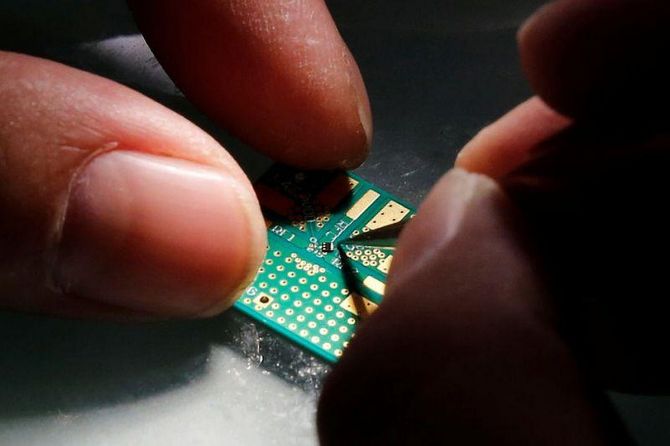 | « Back to article | Print this article |
The semiconductor chip supply for the electric two-wheeler industry has normalised but the prices are up by nearly 50 per cent compared to pre-pandemic period, said Eric Vas, president, Urbanite, the electric vehicle (EV) business of Bajaj Auto.

"It (the supply) has improved greatly. It has pretty much normalised. The problem is the cost.
"The costs remain very high. Hopefully, the costs will start correcting themselves over this fiscal year," he said in an interview with Business Standard.
"For example, in the pre-pandemic period, if the price was Rs 100 for a scheduled supply of chips, today you are paying Rs 150 for the same scheduled supply," he noted.
When asked if the 50 per cent increase was high, he replied: "Yes. But at least you are getting the stuff (chips). It is obviously at the cost of someone else."
Bajaj Auto currently sells only one electric scooter (Chetak).
The number of EVs sold domestically by the company has been increasing rapidly in recent years. In 2020-2021, Bajaj sold 1,395 EVs, which increased to 8,187 in the following year.
In 2022-2023, the company sold 36,263 units, according to Siam data.
In the past two years, the entire auto industry has worked very closely with the semiconductor manufacturers regarding chip supply.
"They have our schedules with them.
"They are able to supply according to it.
"The prices are higher," Vas mentioned.
He said the company currently has 105 Chetak dealerships in 88 cities across the country.
Within six months, the company plans to have 150 Chetak dealerships in 120 cities.
Bajaj is also putting in a lot of effort to train more technicians for its EV business in FY23.
Vas said the company will train about 1,000 technicians (also called dealer service engineers) in FY23 compared to about 280 in FY22.
"We would need to train a much higher number of technicians this fiscal year because not only are we increasing our network, but also because of the churn in the industry," he noted.
All the technicians are being trained at the Pune facility of the company because when they come, Bajaj wants them to see how it makes those vehicles.
"This helps them in understanding a great deal of what we do.
"It is an expensive process, but I think it is a necessary cost that one has to pay at this stage of our evolution," he said.
He said that the automobile industry has always had a high churn of employees.
"You go to an automobile showroom now, and you go back after one year, and you will find that all the people have changed.
The situation in the workshop is a little better, but even it observes a high churn of employees.
So, a 20-25 per cent churn in a workshop is normal in the two-wheeler industry," he noted.
In the electric two-wheeler business, this churn is even higher because every other company is trying to poach.
"Who are the people that are training?
"If I may say so, it is the traditional OEMs (original equipment manufacturers) that are doing most of the training.
"I am certainly training. I know TVS spends a lot of time on training.
"I think Ather to some extent is doing it. The rest are just poaching," Vas mentioned.